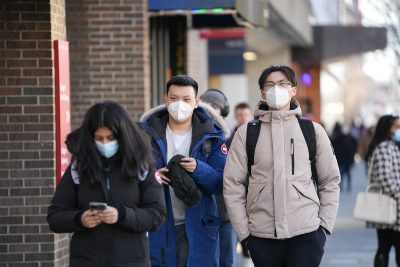
By Fiona Broadie and Tanisha Bhat
Boston University’s COVID-19 positivity rate fell below 1% on Feb. 4 for the first time since Dec. 16. The drop in cases comes one week after the University transitioned to unobserved testing.
Judy Platt, director of Student Health Services and BU’s chief health officer, wrote in an email that the decrease in positive cases is consistent with case counts both locally and nationally.
“We anticipate that we will still have cases regularly given our asymptomatic testing program,” Platt wrote.
Boston registered a 14-day positivity rate of 3.77% between Jan. 23 and Feb. 5. Meanwhile, Massachusetts had a seven-day positivity rate of 3.80% for the week of Feb. 9.
Nationally, case counts have been on a downward trend since Jan. 9.
The shift to unobserved testing Feb. 3 caused some concern among BU’s student body, with some noting how easy it may be to tamper with the kit to achieve a desirable negative result. However, other students noted the convenience and efficiency of this approach.
Charlotte Carr, a sophomore in the College of Arts and Sciences, said the University is putting a lot of trust in students with the “honor code” unobserved testing system.
“I hope everyone sticks to it and actually does the test correctly,” she said. “But how can you possibly be sure of that in a school that’s so huge?”
Platt acknowledged concerns about the truthfulness of collection methods, but wrote that BU believes the “community has shown a commitment to our protocols.”
CAS freshman Kate Bernstein said the ease with which students can fabricate negative test results is “a big concern” to her.
“If someone really didn’t want to submit a valid test, they could get away with it pretty easily,” she said.
BU spokesperson Colin Riley said unobserved testing might encourage more students to comply with the University’s testing rules, adding the University is “pleased” to see its positivity rate drop under 1%.
“We don’t think it’s going to impact positivity rates,” Riley said. “We think it’s possible it will increase compliance.”
Under the new policy, students must now schedule an appointment on Patient Connect to drop off their tests at either 808 Gallery, 700 Beacon St in the Charles River Campus, or 72 East Concord St on the Medical Campus.
Kevin Gonzales, the director of collection site operations, wrote in an email that there were around 4,000 drop-off appointments booked for Feb. 10 as of 12 p.m., noting it is the first day all test results were from take-home kits.
“Today’s my first time trying it out. I feel like it’s convenient and safe,” said Sidney Chen, a sophomore in the Sargent College of Health and Rehabilitation Sciences.
Correction: A previous version of this article incorrectly stated that cases had fallen under 1% on Feb. 7. Cases had dropped below that figure three days earlier. The article has been updated to reflect this change.





























































































































T Ruth Teller • Feb 11, 2022 at 11:53 pm
Let’s hope kids aren’t dumb enough to fake a test – then again how recent was it the current crop of kids were doing the tide pod or shiggy challenge? Let’s hope the pandemic made them smarter and more concerned about their community.